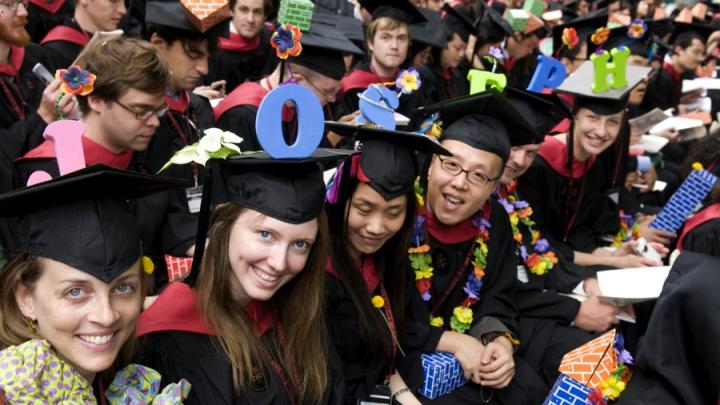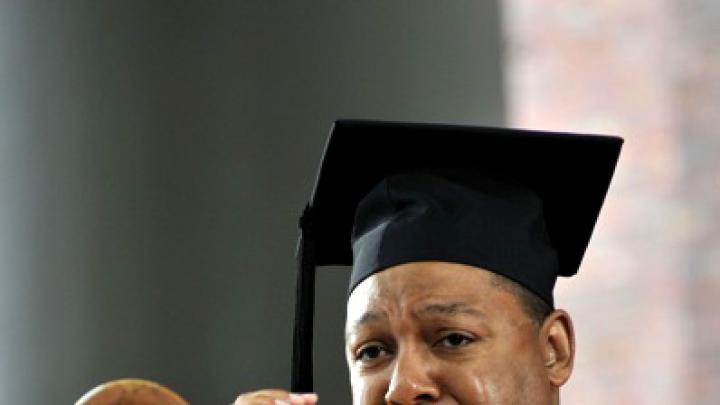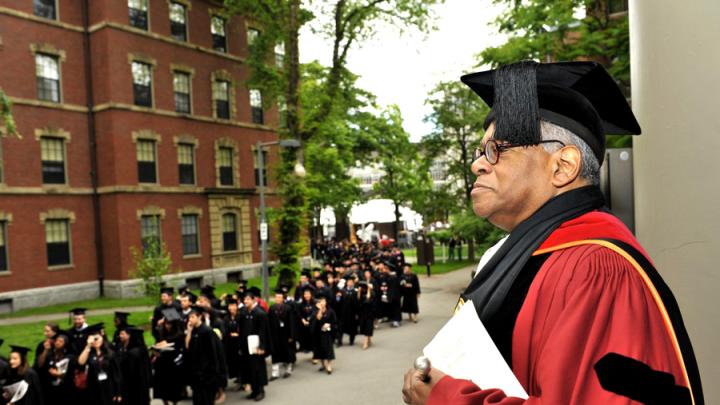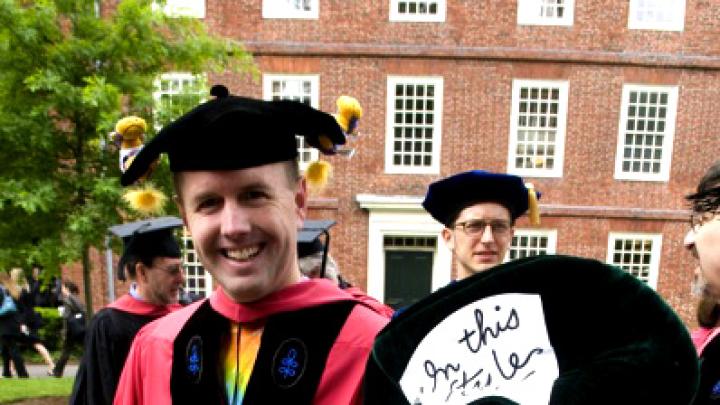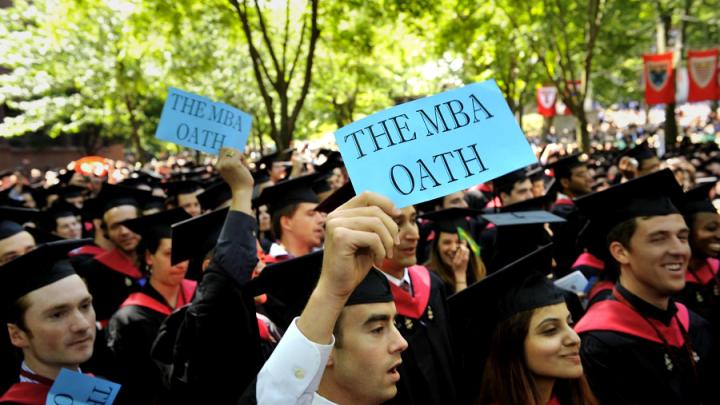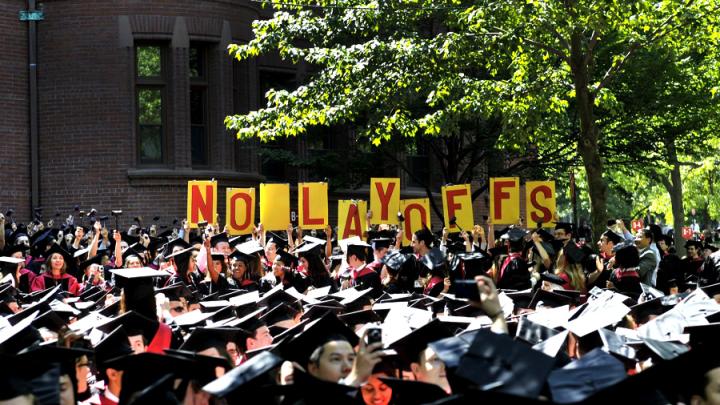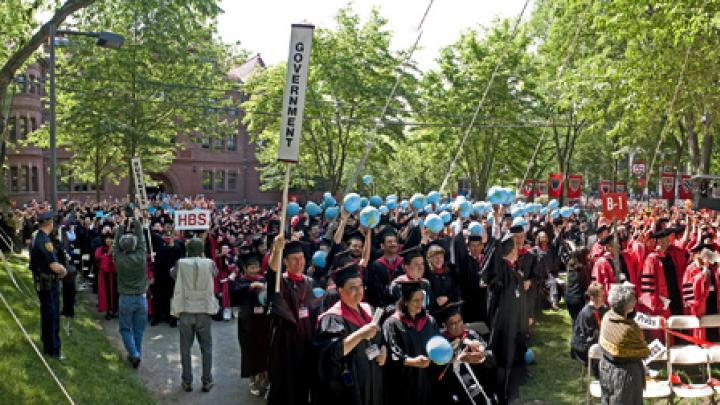The festival rites began festively on June 4. Trumpet in hand, honorand Wynton Marsalis—the first person to win Grammys the same year for jazz and classical recordings—jazzed up the classical Commencement proceedings with a captivating “America the Beautiful” like none ever before rendered in these circumstances. (When his degree was conferred, the University Band saluted the maestro with a spirited “Take the ‘A’ Train.”) It was a resonant reminder of Harvard’s aspirations in the arts (President Drew Faust’s task force on the subject reported last December)—and a welcome respite in a week full of worldly woes that are, for University and many celebrants alike, causing dreams to be deferred.
Faust’s only reference to the principal concern, the 30 percent decline in the endowment (see news reports in this issue; or, review complete coverage of the financial crisis), came in a joke during her Baccalaureate talk to seniors on Tuesday: “I am expected to offer just a few…words of wisdom that will send you on your way. Now I emphasize ‘only a few,’ since in keeping with other reductions, I’ve cut my remarks by 30 percent.” She spoke more somberly about the financial challenges facing universities like Harvard in her Commencement afternoon address (see “Producers of Doubt”).
During the Class Day exercises, Ivy Orator Wlliam Houghteling ’09 called his peers “the most intelligent, accomplished, and unemployed class ever to graduate from Harvard.” He got the day’s biggest laugh by deadpanning, “Harvard is an indestructible American brand—like Lehman Brothers, or General Motors.” In a forgivable moment of jocular gloating, Jamie Dimon, M.B.A. ’82, chairman and CEO of JPMorgan Chase (one of the strong megabanks), prefaced his Business School Class Day maxims by noting of a conspicuously wounded rival, “I just want to make it absolutely clear I left Citigroup 10 years ago.”

Photograph by Stu Rosner
Graduate English speaker Joseph S. Claghorn, M.L.A. ’09
In the Commencement exercises proper, Graduate English speaker Joseph S. Claghorn, M.L.A. ’09, alluding to campus enthusiasm for sustainability, under the slogan “Green is the new Crimson,” observed that as the financial markets swooned, “Harvard accountants realized that…on their balance sheets at least, red had become the new black.”
As Claghorn suggested, not all the talk, silly or sober, was about the economic crisis. The push to lessen campus emissions of greenhouse gases, begun in earnest last October at a community event in Tercentenary Theatre, found many echoes in the Commencement conversation. Gurney professor of English literature and professor of comparative literature James Engell, the orator at the Phi Beta Kappa Literary Exercises on June 2, spoke about the urgency of changing human habits, education, and ethics to effect radically needed changes in mankind’s impact on the environment. Making an analogy that would complement Claghorn’s, he said, “Nature has zero ethical responsibility for us. She will let us take out large, unsecured loans. When we can no longer meet payments, she will silently and surely, with no sentiment whatsoever, repossess the house. After all, we’re only tenants.”
Perhaps making those forces visible, the yellowwood trees planted in Tercentenary Theatre in the 1990s to bloom during Commencement week had opened many days earlier, and shed their petals on the celebrants this June 4. Even the mighty adapt: starting this fall, Harvard’s academic year begins earlier, bringing Commencement forward, too—to May 27, 2010. (Among the accomplishments of one of the honorary-degree recipients, Sidney Verba, was guiding that calendar reform toward fruition.)
The exclamation point on the environmental theme was the afternoon address of U.S. Secretary of Energy Steven Chu, now a passionate evangelist for checking climate change by building a new energy system for the world. (For an excerpt, see “A Passion and a Voice”)
Then there was war. Incredibly, from a Cantabrigian perspective, the largest events of June 4 took place elsewhere: in Beijing, where Tiananmen Square lay silent on the twentieth anniversary of the brutal confrontation in 1989; and in Cairo, where President Barack Obama, J.D. ’91, addressed America’s relationship with the worldwide Muslim community. But international matters still resonated at Harvard.
An unusually large crowd attended the Reserve Officers’ Training Corps commissioning ceremony on June 3. They heard from both General David H. Petraeus, newly in charge of the increasingly dangerous war in Afghanistan and Pakistan, and President Faust. (The soldier’s son, an ROTC cadet at MIT, was graduating later in the week.)
A quieter, ground-level perspective on the same conflict came from the College reunion class of 1984’s chief marshal for Commencement, Sarah P. Chayes (see “Fighting for Afghanistan,” January-February 2008, page 75). At the Chief Marshal’s Spread after the morning exercises, Chayes recalled that she had grown up in Cambridge and attended the college “next door.” Just a week earlier, she had been talking with tribal chiefs on the Afghanistan-Pakistan border about the Taliban, and then had worked her way back to campus—stopping off the night before to drink beers with Lt. General Stanley A. McChrystal, recently nominated to assume command of the U.S. forces in Afghanistan. The great distance in space and time and culture that journey had encompassed made her think of her class’s experience in the 1980s, and its contemporary resonances. “Failure and meltdown, personal and societal,” Chayes said, “can be an incredible opportunity to inject meaning” into an individual life or a society. (The next day, Radcliffe conferred an Alumnae Recognition Award on her as well.)
Finally, there was pestilence. With the H1N1 influenza lurking in the background, the University on June 3 informed its Local Emergency Management Teams that “University Health Services is reporting a slight uptick in the number of people treated for respiratory illnesses and fever in the last 24 hours.” Commencement emotions to the contrary notwithstanding, the medical sages recommended, in Alert Officialese, “that we forgo the traditional handshakes and embraces that accompany graduation ceremonies.”
And so, when it came time to confer degrees on the undergraduates, Provost Steven E. Hyman ordered the black-gowned throng to rise, and boomed out the traditional words: “Their chosen representatives, together with candidates for those degrees summa cum laude, will draw near.” They did so. President Faust rose, applauding. But where the venerable “Form of Conferring Degrees” commands, “the President and Deans greet and shake hands” with the aforesaid chosen representatives and summa candidates, nary a hand was shaken, nor hug exchanged. That afternoon, School of Public Health dean Julio Frenk, presiding at his first Harvard graduation, was able to put his expertise, and his students’, immediately to work. He announced the no-handshake protocol (“We’re instituting a shoulder tap instead”), and attendees found a bottle of hand sanitizer alongside the program on each chair.
Clearly, the world was very much with the University in 2009: no ivory tower for the Ivy League this Commencement season. The enduring theme was economic uncertainty, best captured by the Senior English speaker (see “This Shaking Keeps Us Steady”). New circumstances compelled the University to recalculate its means, and to refocus on its singular ends. Both Faust and Chu ventured that: each endorsed the pursuit of scientific discovery, and of its practical application. From their very different backgrounds, both also found a common purpose for university communities—and their beneficiaries—in the broadest form of humanistic inquiry.
